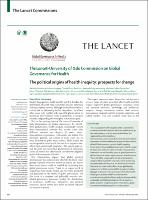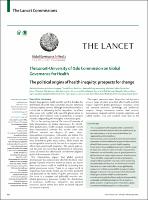Browsing by Author "Chongsuvivatwong, Virasakdi"
Now showing items 1-2 of 2
-
The political origins of health inequity: prospects for change
Ottersen, Ole Petter; Dasgupta, Jashodhara; Blouin, Chantal; Buss, Paulo; Chongsuvivatwong, Virasakdi; Frenk, Julio; Fukuda-Parr, Sakiko; Gawanas, Bience P.; Giacaman, Rita; Gyapong, John; Leaning, Jennifer; Marmot, Michael; McNeill, Desmond; Mongella, Gertrude I.; Moyo, Nkosana; Møgedal, Sigrun; Ntsaluba, Ayanda; Ooms, Gorik; Bjertness, Espen; Lie, Ann Louise; Moon, Suerie; Roalkvam, Sidsel; Sandberg, Kristin I.; Scheel, Inger B. (The Lancet, 2014-02-11)
Despite large gains in health over the past few decades, the distribution of health risks worldwide remains extremely and unacceptably uneven. Although the health sector has a crucial role in addressing health inequalities, its eff orts often come into confl ict with powerful global actors in pursuit of other interests such as protection of national security, safeguarding of sovereignty, or economic goals. This is the starting point of The Lancet–University of Oslo Commission on Global Governance for Health. With globalisation, health inequity ... -
The political origins of health inequity: prospects for change
Ottersen, Ole Petter; Dasgupta, Jashodhara; Blouin, Chantal; Buss, Paulo; Chongsuvivatwong, Virasakdi; Frenk, Julio; Fukuda-Parr, Sakiko; Gawanas, Bience P; Giacaman, Rita; Gyapong, John; Leaning, Jennifer; Marmot, Michael; McNeill, Desmond; Mongella, Gertrude I; Moyo, Nkosana; Møgedal, Sigrun; Ntsaluba, Ayanda; Ooms, Gorik; Bjertness, Espen; Lie, Ann Louise; Moon, Suerie; Roalkvam, Sidsel; Sandberg, Kristin I; Scheel, Inger B (The Lancet - University of Oslo Commission on Global Governance for Health, 2014)
Despite large gains in health over the past few decades, the distribution of health risks worldwide remains extremely and unacceptably uneven. Although the health sector has a crucial role in addressing health inequalities, its efforts often come into conflict with powerful global actors in pursuit of other interests such as protection of national security, safeguarding of sovereignty, or economic goals. This is the starting point of The Lancet–University of Oslo Commission on Global Governance for Health. With globalisation, health inequity ...


